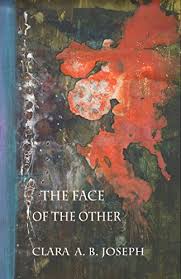REVIEW: THE FACE OF THE OTHER | BY CLARA A.B. JOSEPH

Interactive Press | 2016 | 78 pages | $18.00 | Purchase online
Review by Sarah-Jean Krahn
—
Glimpsing the Face of the Poet through The Face of the Other
As a scholar in post-colonial theory and literature, Clara A. B. Joseph is fiercely aware of the forced foreignness of the Other at a global or cultural level, a state of violence which is repudiated in The Face of the Other, her debut book of poetry. But even as Joseph exposes the ongoing role of colonial power in a painful othering process, she has not forgotten the tension between self and other on an individual, heartfelt level, whether or not that tension crosses borders. And, though recognized primarily as an academic, Joseph adopts sensitively the language of poetry as a tool to help resolve this tension between self and other, not through violent assimilation of other into the self, but by dissolving self into the other.
The everything and nothing that the Other can be, with its gaping capital-O, is denoted in The Face of the Other by the Omega character or Ohm symbol, Ω, which marks within Joseph’s long poem each unexpected face. No matter whose face appears, the ‘Om’ sound of the yogi resounds alongside the ‘Great O,’ perhaps “the dark / mother’s face” (3), the open mouth of the goddess from whom humanity sprang. And while Ω, or “The End”—the last letter of the Greek alphabet—signals the end of each piece, the long poem as a whole is united by musings on the humanism of the other in the manner of philosopher Emmanuel Levinas, whose work informs Joseph’s.
When reading Levinas, however, exactly whose face is conceived to shape the visage of the Other? In Western philosophy, undoubtedly, the default human face is Man’s. In The Face of the Other, while the faces of the many unsettle the reader, the face of Woman unsettles humanism itself. Whether the old woman or the woman stoned, the woman at war or the cab-driver’s wife, her mother or your mother or my mother, Woman “[breaks] your peace” (45) with the ghost of the human face in the mind: no longer a man’s face only, but hers also.
The faces of girls and the faces of boys arrest the reader further with a virtue bruised by ignorant sin or awareness beyond their years. No human Joseph portrays may escape the mark of the animal that underlies the bodily fluids of humanity. The shit, the pee, and the f U c k all fracture humanity’s attempts to differentiate itself from the cats, the squirrels, and those it dines on. Meanwhile, even the portrait of a caterpillar is unexpectedly sorrowful, painted with grace and acuity.
The place this long poem may be found wanting is where Joseph subordinates her voice to the experiences of the others whom she observes rather than constantly negotiating her voice’s relationship with her subjects. While it is clear that the other can’t exist without the self, and the self can’t exist without the other—even as the other looks down the barrel of a gun or finds her bed bombed—the poet does go missing, and the reader misses her.
As the final Ω approaches, Joseph’s voice returns, offering an apology for doing poetry wrong (considering her occasional rhyme) along with a poignant revelation that hammers home her own humanity: not even a poet, with her perceptive command of language’s beauty, can be an invisible heroine to her readers. For, the author is no less human than her subjects, no less animal than a lamb, and no more faceless than her reader. She makes mistakes, performs self-criticism, and personally struggles. So, while the poet determinedly sets her “facelessness / towards Jerusalem,” the reader cannot read The Face of the Other without glimpsing her face.
—
Sarah-Jean Krahn is the Managing Editor of the feminist creative writing journal S/tick and holds an MA in Cultural Studies and Critical Theory from McMaster University. Her award-winning writing appears in various anthologies and journals, including the Berkeley Poetry Review and Feminist Studies, and her poetry was recently nominated for a Pushcart. When not writing or tutoring students in English and writing, Sarah-Jean can be found reading on the bus, walking in the woods, or researching vegan nutrition with her husband. More from Sarah-Jean is available at sarahjeancreates.com; you can visit S/tick at http://s-tick.tumblr.com.
